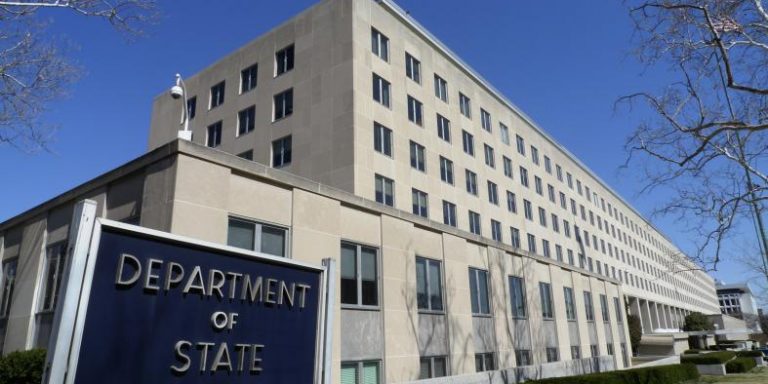INTELBRIEF
June 6, 2022
IntelBrief: Behind the Scenes of the U.S. Government’s Recent Foreign Terrorist Organization De-listings

Bottom Line Up Front
- Over the course of a single day last month, the U.S. State Department removed five terrorist groups from its Foreign Terrorist Organization (FTO) list, more than it has ever done before in one action.
- The State Department revoked FTO designations of several groups now considered defunct, including Aum Shinrikyo, Basque Fatherland and Liberty (ETA), Kahane Chai, Gam’a al-Islamiyya, and the Mujahidin Shura Council in the Environs of Jerusalem.
- Decisions to remove terrorist groups from FTO lists can be difficult, especially when these groups have killed numerous individuals over a long period of time while also threatening the stability of countries and regions.
- Removing defunct groups from terrorism lists is important for ensuring the vitality of the use of sanctions as a counterterrorism financing tool.
In a little noticed move in late May, the U.S. Department of State removed five defunct terrorist groups from its list of Foreign Terrorist Organizations (FTO). At the same time, the State Department removed six deceased individuals who were previously listed as Specially Designated Global Terrorists (SDGTs) pursuant to Executive Order 13224. To minimize drawing public attention to the decisions, the State Department eschewed a public relations campaign over social media, but did issue a press release detailing the revocations and reasoning behind such a significant move. The groups remain designated as Specially Designated Global Terrorist (SDGT) entities, which subjects them to a less stringent level of sanctioning. Prior to May 2022, since the inception of the FTO list in 1997, the Department of State had only revoked the designations of 15 groups. The decision to remove five FTOs in one day was a major decision – and represented 25% of the groups ever removed from the FTO list. In fact, in less than two years, the Biden administration has removed seven groups from the FTO list, matching the number of FTO removals the Obama administration executed over the course of eight years. Previously, the Biden administration revoked the designation of the Revolutionary Armed Forces of Colombia (FARC) and Ansarallah, popularly known as the Houthi movement.
The May 2022 State Department decision removed Aum Shinrikyo (AUM), Basque Fatherland and Liberty (ETA), Gam’a al-Islamiyya (IG), Kahane Chai (Kach), and the Mujahidin Shura Council in the Environs of Jerusalem (MSC) from the FTO list. AUM is best known for having carried out a deadly sarin gas attack on the Tokyo subway in 1995. ETA, a group that primarily fought for Basque independence and separation from Spain, is known for conducting one of Europe’s longest terrorist campaigns, from its founding in 1959 until the group decided to dissolve itself in a written announcement in 2018. Founded in the early 1990s, IG was responsible for a series of terrorist acts in Egypt that killed hundreds. Most notably the group was led by Omar Abdel-Rahman, the so-called blind sheikh who was behind the 1993 attack on New York’s World Trade Center that resulted in six deaths and more than one thousand injured. Kahane Chai was the only radical right-wing Jewish extremist group on the State Department’s FTO list. Kahane Chai and its later offshoot Kach pursued a campaign of terror against Palestinian Arabs for years. Finally, the Department of State removed MSC from its FTO list, a mere eight years after it was added. Perhaps the least well known of the delisted groups, the MSC, according to a 2014 State Department press release, carried out rocket attacks against Israel from the Gaza Strip.
The decisions to remove these groups from the FTO list were long overdue and the Biden administration’s decision to revoke these designations should not be interpreted as a sign of weakness on the counterterrorism front. Removing FTOs from the list is notoriously difficult because the risks of alienating countries and populations affected by them can be quite high. To minimize diplomatic fallout, the Department of State intentionally removed numerous groups and dead individuals from the list at the same time. Thus, the United States can justify the removals to international partners as a routine bookkeeping exercise intended to keep the list current. Along these lines, the Department of State’s press release explains, “these actions are intended to reflect the United States’ resolve to comply with legal requirements to review and revoke FTO designations when the facts compel such action.” Moreover, the State Department went out of its way to explain that the de-listings were also a reflection of “the success Egypt, Israel, Japan, and Spain have had in defusing the threat of terrorism by these groups.”
Just as important as touting the success of counterterrorism operations that contributed to the demise of the five delisted FTOs is the decision to make the FTO list more credible by removing defunct groups. While these groups were on the FTO list for far too long, the decision to revoke their designations now contributes to the overall credibility of the FTO list. Having defunct groups on terrorist lists, simply put, makes these lists less relevant. Additionally, keeping defunct groups and organizations that have avoided or transitioned away from violence in favor of political solutions on terrorism lists is unnecessarily punitive and some would argue, altogether counterproductive. Instead, removing defunct or reformed groups from terrorism lists feeds into an important aspect of sanctions – to ensure this very important counterterrorism financing tool is used only for preventative purposes.